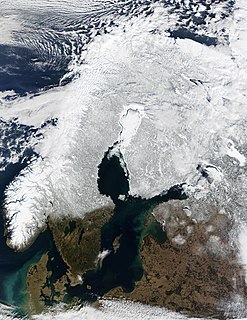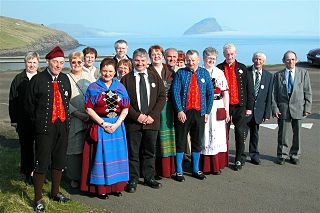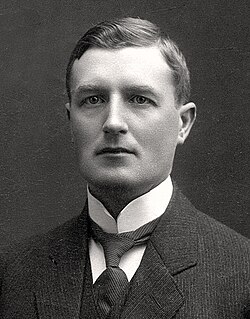Related Research Articles

Heimskringla is the best known of the Old Norse kings' sagas. It was written in Old Norse in Iceland by the poet and historian Snorri Sturluson (1178/79–1241) c. 1230. The name Heimskringla was first used in the 17th century, derived from the first two words of one of the manuscripts.

Scandinavia is a subregion in Northern Europe, with strong historical, cultural, and linguistic ties.

The Norsemen were a North Germanic ethnolinguistic group of the Early Middle Ages, during which they spoke the Old Norse language. The language belongs to the North Germanic branch of the Indo-European languages and is the predecessor of the modern Germanic languages of Scandinavia. During the late eighth century, Scandinavians embarked on a large-scale expansion in all directions, giving rise to the Viking Age. In English-language scholarship since the 19th century, Norse seafaring traders, settlers and warriors have commonly been referred to as Vikings. Historians of Anglo-Saxon England distinguish between Norse Vikings (Norsemen) from Norway who mainly invaded and occupied the islands north and north-west of Britain, Ireland and western Britain, and Danish Vikings, who principally invaded and occupied eastern Britain.
Sagas are prose stories and histories, composed in Iceland and to a lesser extent elsewhere in Scandinavia.

The Viking revival was a movement reflecting new interest in, and appreciation for Viking medieval history and culture. Interest was reawakened in the late 18th and 19th centuries, often with added heroic overtones typical of that Romantic era. The revival began earlier with historical discoveries and early modern publications dealing with Old Norse culture. The first printed edition of the 13th century Gesta Danorum or the Legend of the Danes by Saxo Grammaticus, came out in 1514 just as book printing began become more practical and printing trade was quickly spreading. In 1555, the Historia de gentibus septentrionalibus, or "History of the northern peoples", by Olaus Magnus was produced. The pace of publication increased during the 17th century with Latin translations of the famous Edda, notably Peder Resen's Edda Islandorum of 1665. The Edda consisted of two 13th century Medieval Icelandic literary works on Norse mythology, written down in the 13th century, but certainly from older oral sources: they are the Prose Edda, and an older collection of poems without an original title now known as the Poetic Edda. The books are the main sources of medieval skaldic tradition of poetry and storytelling in Iceland and Norse mythology.

Hilda Roderick Ellis Davidson was an English folklorist. She was a scholar at the University of Cambridge and The Folklore Society, and specialized in the study of Celtic and Germanic religion and folklore.

Faroese people or Faroe Islanders are a North Germanic ethnic group and nation native to the Faroe Islands. The Faroese are of mixed Norse and Gaelic origins. About 21,000 Faroese live in neighbouring countries, particularly in Denmark, Iceland and Norway. Most Faroese are citizens of the Kingdom of Denmark, in which the Faroe Islands are a constituent nation. The Faroese language is one of the North Germanic languages and is closely related to Icelandic and to western Norwegian varieties.
Hermann Pálsson was an Icelandic language scholar and translator, "one of the most distinguished scholars of Icelandic studies of his generation". Often working in collaboration with others such as Magnus Magnusson or Paul Edwards, he translated around 40 works of medieval Icelandic literature.
Eric Valentine Gordon was a Canadian philologist, known as an editor of medieval Germanic texts and a teacher of medieval Germanic languages at the University of Leeds and the University of Manchester.
Old Norse literature refers to the vernacular literature of the Scandinavian peoples up to c. 1350. It chiefly consists of Icelandic writings.

Edward Oswald Gabriel Turville-Petre was an English philologist who specialized in Old Norse studies.
Gwyn Jones was a Welsh novelist and story writer, and a scholar and translator of Nordic literature and history.

Magnus Bernhard Olsen was a Norwegian philologist who specialized in Old Norse studies.
Margaret Beryl Clunies Ross is a medievalist who was until her retirement in 2009 the McCaughey Professor of English Language and Early English Literature and Director of the Centre for Medieval Studies at the University of Sydney. Her main research areas are Old Norse-Icelandic Studies and the history of their study. Since 1997 she has led the project of editing a new edition of the corpus of skaldic poetry. She has also written articles on Australian Aboriginal rituals and contributed to the Oxford Dictionary of National Biography.
Ursula Miriam Dronke was a medievalist and former Vigfússon Reader in Old Norse at the University of Oxford and an Emeritus Fellow of Linacre College. She also taught at the University of Munich and in the Faculty of Modern and Medieval Languages at Cambridge University.
George Benson Johnston was a Canadian poet, translator, and academic "best known for lyric poetry that delineates with good-humoured wisdom the pleasures and pains of suburban family life." He also had an international reputation as a scholar and translator of the Icelandic Sagas.

North Germanic peoples, commonly called Scandinavians, Nordic peoples and in a medieval context Norsemen, are a Germanic ethnolinguistic group of the Nordic countries. They are identified by their cultural similarities, common ancestry and common use of the Proto-Norse language from around 200 AD, a language that around 800 AD became the Old Norse language, which in turn later became the North Germanic languages of today.

Lee Milton Hollander was an American philologist who specialized in Old Norse studies. Hollander was for many years head of the Department of Germanic Languages at the University of Texas at Austin. He is best known for his research on Old Norse literature.

Andrew Nicholas Wawn is emeritus professor of Anglo-Icelandic literature at the University of Leeds and an expert on Old Norse sagas and their reception in the modern era.
Elizabeth Ashman Rowe is an American historian and author who specializes in the study of the history and culture of the Viking Age.
References
- ↑ J.J., "Peter Godfrey Foote (Obituary)", Saga-Book 34 (2010) 87-91.
- 1 2 3 4 5 "Peter Foote obituary: Wide-ranging scholar of Old Norse and Icelandic literature", The Guardian 18 November 2009.
- 1 2 3 4 5 6 7 "Professor Peter Foote: expert on Icelandic and Old Norse studies", The Times 14 October 2009.
- ↑ Chris Abram, "Peter Foote", Old Norse News 1 October 2009, archived on 1 November 2010.
- 1 2 "Professor Peter Foote (1924-2009)", UCL Scandinavian Studies, University College London, retrieved 22 December 2009.
- ↑ "Utenlandske medlemmer" (in Norwegian). Norwegian Academy of Science and Letters. Archived from the original on 15 July 2007. Retrieved 2 July 2021.